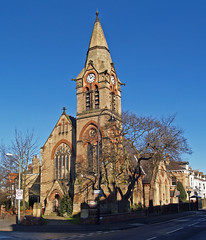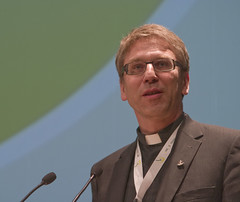Representative session of Methodist Conference 2011 began on Saturday and included addresses from Revd Leo Osborn, the new President of Conference and Ruth Pickles, the new Vice President. Both mentioned ecumenism in their opening address.
Leo Osborn's
address included the following passage.
Balance - But perhaps balance is not as pejorative a word as Sir Humphrey would have us believe. Indeed along with the word pragmatic they might be thought to sum up the ethos of Methodism and I am honoured and proud if the Methodist Church believe that I can offer it as President. So I am unashamedly:
Evangelical - For I believe that at the heart of Christian faith is a profound relationship with God through Jesus Christ and I long for people to discover that for themselves. I believe in the centrality of the Cross and Resurrection and in the overriding authority of Scripture but I don’t find that that provides me with answers to every question or that despite living in Newcastle every moral or ethical decision is black and white. Indeed I have some sympathy with John Robinson of Honest to God fame who towards the end of his life said that he believed more and more about less and less!
Sacramental - For the sacraments - and especially that of Holy Communion - have become more and more important to me and a continual means of grace. And yet it is a means and not an end and I have to guard against a spirituality that becomes dry and lifeless and a mere going through the motions.
Ecumenical - For I long and pray for the unity of the church in visible form and want to encourage every initiative to bring it nearer. It is for me about common sense as well as common grace. Yet I am proud to be a Methodist and more excited than I have ever been about what God is doing in the Methodist Church today and whatever the shape of the church might look like in 20 or 30 years time I believe we as Methodists will have an enormous amount to put into the mix for the enrichment of the whole.
And having said all of that I thank God for those who do not carry an evangelical, sacramental or ecumenical label, who may carry a different label or no label at all but from whom I have learnt so much .
Ruth Pickles address includes a brief reference to her experience of ecumenism as a student:
In my first week in Sheffield I was 'found' by the Methodist Chaplain and introduced to the Methodist Society (Meth Soc.) which met at Broomhill Methodist Church. Here was another peer group more than 100 strong, and one that was to take me on from where North Harrow had left off. Here it was natural to do things differently. Here we had our experience acknowledged and were enabled to reflect critically on it. The new Chaplain who arrived in my second year, Revd. John Farley, opened a door into biblical scholarship and gave us an understanding of the Bible which was informed and enlightening. His teaching and preaching took the Bible, us and our context seriously. Some of his sermons were printed as pamphlets, but it was not until after his death in 2006 that a compilation was published under the title TSEDEQH & other sermons. To quote from a more illustrious student of John's, Revd. Dr. Colin Morris, 'John recognised that his hearers had minds to be stimulated and hearts to be warmed'. If only all preachers could meet both needs! Thank you John, for God worked through you to encourage me and countless numbers of students in a faith journey that cherished the biblical principles of justice and righteousness. Tsedeqh.
This was also a time of intense ecumenical activity, and we were able to work and share worship with the other Christian groups, including Roman Catholics. (Though we weren't as ecumenical when it came to the annual entry for the Rag float - Meth Soc had a strong reputation to maintain on that front.) I owe a debt too, to many of other denominations and some of other faiths. The Spirit of God does is not limited by boundaries in the same way that we are, for which I am thankful.
Without reading too much into these excerpts, they are an interesting contrast. Something I often encounter is the contrast between the experience of ecumenism and its theory. Of course both go together but Ruth Pickles' experience as a student echoes the experience of many young people of the reality of fellowship between traditions. Does this experience lead inevitably to Leo Osborn's desire for visible unity or is experience enough?
 Image via Wikipedia
Image via Wikipedia

























